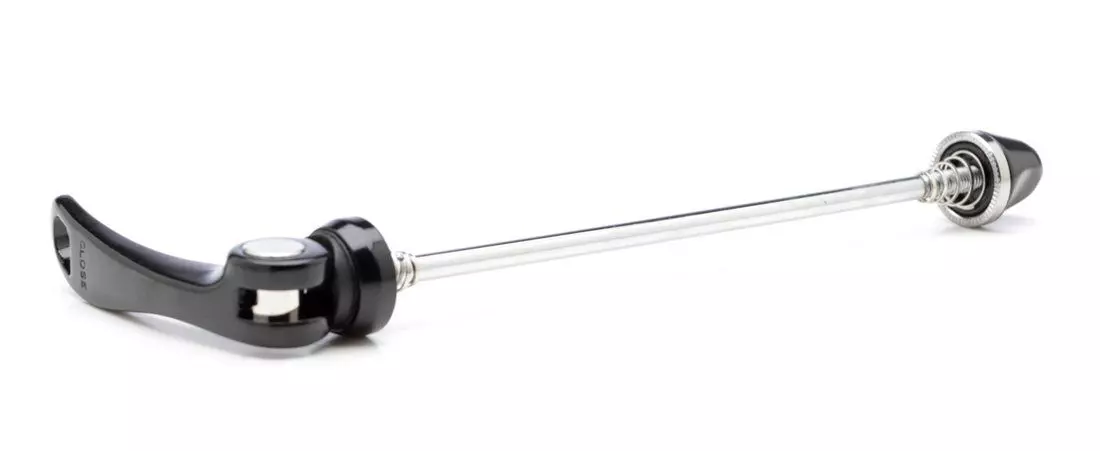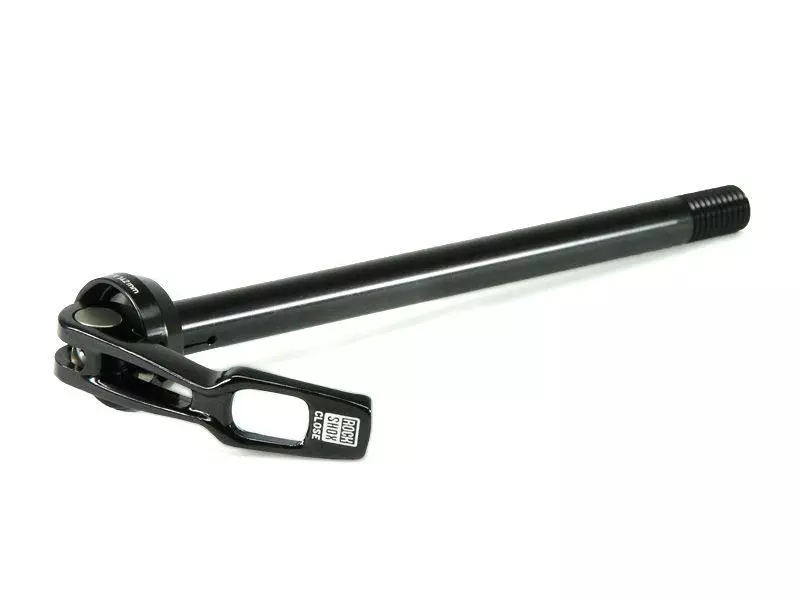No products in the cart.
The differences between a thru axle and a skewer explained.
We get quite a few questions about the difference between an older style quick release skewer and a newer thru-axle. Thru-axles have been in mountain bikes since around 2010 and are now common in road bikes as well. But there are still many bikes that have skewers. Learn a little about the difference.
Skewers
Way back in 1927, Italian bike racer Tullio Campagnolo (yes, that “Campy”) was frustrated when he was racing and attempted to change gears in a race. At that time there was one cog on each side of the hub, so “changing gears” meant that you had to undo the wingnuts that held the wheel on, then take the wheel off, flip it around, and reinstall it by threading the nuts back on. You can see that during a race, this was an arduous process.
So, like a good bike fanatic, he invented a solution – the quick release skewer, which allowed him to quickly change his wheel. The “quick release”, or QR, skewer was a thin rod that went into an axle that was inside the hub. Since then, the 5mm quick release skewer became the industry standard on bicycles. A QR is 5mm thick and is steel. It looks something like this:

Thru Axles
Right about 2010, as disc brakes and suspension proliferated in mountain bikes, the thru axle started to replace the old skewer. Beefy suspension forks called for a stiffer connection with the wheel and disc brakes required smaller tolerances for the wheel to sit properly in the frame so the brakes did not rub. Front thru axles generally went to 15mm in diameter in the front, and the common rear axle went to 12mm in diameter. Like this:
Some thru axles have a cam-looking lever and some are lower profile and bolt-on. However, thru axles are different than a skewer because rather than using a camming mechanism to hold the wheel on, a thru axle threads directly into your bike frame. Your bike has a thru axle if the “drop out” is a hole, rather than a U-shaped dropout. This provides added security because even if the lever on the end of the thru axle flips open, it is still threaded into the frame, holding your wheel on. If you stay up on bike news, you may have heard about the very widespread recall of bikes that have a front quick release combined with disc brakes.
Is there a performance difference? YES. Thru axles provide a stiffer ride, which can be beneficial in both the front and rear of a bike. In mountain bikes in particular, this allows for more torque and less flex for your whip.
So, if you have a thin, 5mm rod, then you have a skewer. If you have a 12mm threaded piece, then you have a thru axle.
A word of caution: In the early life of thru axles, some bike manufacturers went with a 10mm thru-axle. These are fairly rare, but we have seen some cases. If you have any question about your axle being 10mm in diameter, be sure to measure it using our Fitment Guide.

8 Comments
I have a skewer on my Framed Minnesota fat bike, not the new 12mm axle type. Do you offer a 170mm skewer set-up I can use with my BOB trailer? If not, can you suggest where I might find one? Thank you.
Mark,
We only produce 12mm thru-axle solutions, at this time. We are not aware of anyone offering a traditional 5mm skewer for 170 or 190 fatbikes.
Can a skewer wheel be converted to a through axel?
Yes, sometimes both the wheels and the frame can be converted to accept thru axles. You really should check with your local dealer to determine if your specific components can be made compatible.
Any plans on making a 10mm version? My two top choice bikes in my stable for using my BOB both use 10, the top choice is my Jones converted to use a thru axle rohloff hub…
Kraken,
We do not have any immediate plans for 10×135 thru axles. Now keep in mind not all 10mm axles are thru axles. And there are BOB nutz available for traditional 10mm bolted axles. That may not help your situation as you’re clearly speaking of a Rohloff that is thru axle compatible. For certain we do not have a solution for that. But perhaps someone reading this in future will find the BOB Nutz helpful for their situation.
http://www.bobgear.com/bike-trailers/bob-nutz
Amazing article. There was a lot of info I have been meaning to research but never got around too. This blog is really a big help. Thank you!
You explained the main differences well.
Thank you.